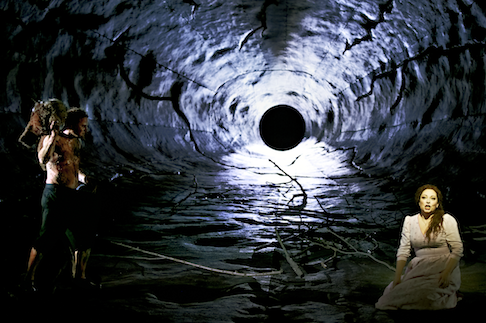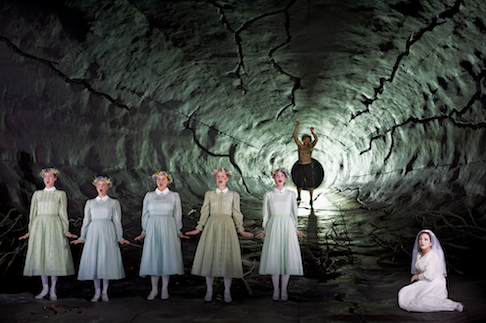Recently in Performances
English Touring Opera are delighted to announce a season of lyric monodramas to tour nationally from October to December. The season features music for solo singer and piano by Argento, Britten, Tippett and Shostakovich with a bold and inventive approach to making opera during social distancing.
This tenth of ten Live from London concerts was in fact a recorded live performance from California. It was no less enjoyable for that, and it was also uplifting to learn that this wasn’t in fact the ‘last’ LfL event that we will be able to enjoy, courtesy of VOCES8 and their fellow vocal ensembles (more below …).
Ever since Wigmore Hall announced their superb series of autumn concerts, all streamed live and available free of charge, I’d been looking forward to this song recital by Ian Bostridge and Imogen Cooper.
Although Stile Antico’s programme article for their Live from London recital introduced their selection from the many treasures of the English Renaissance in the context of the theological debates and upheavals of the Tudor and Elizabethan years, their performance was more evocative of private chamber music than of public liturgy.
Evidently, face masks don’t stifle appreciative “Bravo!”s. And, reducing audience numbers doesn’t lower the volume of such acclamations. For, the audience at Wigmore Hall gave soprano Elizabeth Llewellyn and pianist Simon Lepper a greatly deserved warm reception and hearty response following this lunchtime recital of late-Romantic song.
For this week’s Live from London vocal recital we moved from the home of VOCES8, St Anne and St Agnes in the City of London, to Kings Place, where The Sixteen - who have been associate artists at the venue for some time - presented a programme of music and words bound together by the theme of ‘reflection’.
'Such is your divine Disposation that both you excellently understand, and royally entertaine the Exercise of Musicke.’
‘And there was war in heaven: Michael and his angels fought against the dragon; and the dragon fought and his angels, And prevailed not; neither was their place found any more in heaven … that old serpent … Satan, which deceiveth the whole world: he was cast out into the earth, and his angels were cast out with him.’
There was never any doubt that the fifth of the twelve Met Stars Live in Concert broadcasts was going to be a palpably intense and vivid event, as well as a musically stunning and theatrically enervating experience.
‘Love’ was the theme for this Live from London performance by Apollo5. Given the complexity and diversity of that human emotion, and Apollo5’s reputation for versatility and diverse repertoire, ranging from Renaissance choral music to jazz, from contemporary classical works to popular song, it was no surprise that their programme spanned 500 years and several musical styles.
The Academy of St Martin in the Fields have titled their autumn series of eight concerts - which are taking place at 5pm and 7.30pm on two Saturdays each month at their home venue in Trafalgar Square, and being filmed for streaming the following Thursday - ‘re:connect’.
The London Symphony Orchestra opened their Autumn 2020 season with a homage to Oliver Knussen, who died at the age of 66 in July 2018. The programme traced a national musical lineage through the twentieth century, from Britten to Knussen, on to Mark-Anthony Turnage, and entwining the LSO and Rattle too.
With the Live from London digital vocal festival entering the second half of the series, the festival’s host, VOCES8, returned to their home at St Annes and St Agnes in the City of London to present a sequence of ‘Choral Dances’ - vocal music inspired by dance, embracing diverse genres from the Renaissance madrigal to swing jazz.
Just a few unison string wriggles from the opening of Mozart’s overture to Le nozze di Figaro are enough to make any opera-lover perch on the edge of their seat, in excited anticipation of the drama in music to come, so there could be no other curtain-raiser for this Gala Concert at the Royal Opera House, the latest instalment from ‘their House’ to ‘our houses’.
"Before the ending of the day, creator of all things, we pray that, with your accustomed mercy, you may watch over us."
The doors at The Metropolitan Opera will not open to live audiences until 2021 at the earliest, and the likelihood of normal operatic life resuming in cities around the world looks but a distant dream at present. But, while we may not be invited from our homes into the opera house for some time yet, with its free daily screenings of past productions and its pay-per-view Met Stars Live in Concert series, the Met continues to bring opera into our homes.
Music-making at this year’s Grange Festival Opera may have fallen silent in June and July, but the country house and extensive grounds of The Grange provided an ideal setting for a weekend of twelve specially conceived ‘promenade’ performances encompassing music and dance.
There’s a “slide of harmony” and “all the bones leave your body at that moment and you collapse to the floor, it’s so extraordinary.”
“Music for a while, shall all your cares beguile.”
The hum of bees rising from myriad scented blooms; gentle strains of birdsong; the cheerful chatter of picnickers beside a still lake; decorous thwacks of leather on willow; song and music floating through the warm evening air.
Performances
![Scene from <em>Der Freischütz</em> [Photo by Katrin Ribbe]](http://www.operatoday.com/freischuetz_011.png)
12 Sep 2016
Der Freischütz at Unter den Linden
Rarely have I experienced such fabulous singing in such a dreadful
production. With magnificent voices, Andreas Schager and Dorothea
Röschmann rescued Michael Thalheimer’s grotesque staging of von
Weber’s Der Freischütz. At Staatsoper Unter den Linden,
Alexander Soddy led a richly detailed, transparent and brilliantly glowing
Berliner Staatskapelle.
As the voices had the best kind of chemistry, the extremes of musical
excellence and ugly setting made for an ambivalent experience.
Thalheimer’s staging will be difficult to forget, because the great
resonance of the energetic music, passionate vocals, and Martin Wright’s
choir made it highly memorable.
While Weber’s Der Freischütz is not often performed, the
‘first German Romantic opera’ has increasingly more new productions
popping up across Germany. Based on a folk legend Friedrich Kind wrote the
libretto: about Max the forester, his love for the head forester’s
daughter, Casper his nemesis’s envy, and the forest demon, Samiel, up to
no good. Magic bullets, female forebodings, spirits of the dead, dark magic,
and the forest setting contribute to the work’s rich Romanticism. The
Overture and the Wolf’s Glen Scene music are often performed in symphony
halls. Weber weaved German folk tunes in the dark Romantic score.
Olaf Altmann’s grey stage, made up of a hole in the back of the stage
as entrance of a metallic cavern through which the people crawl on stage. Olaf
Freese’s lighting helped brighten the grim tone with his atmospheric,
sometimes colourful effects. Thalheimer has been directing more and more opera
(I was also disappointed by take on Verdi’s Otello in Antwerp).
He leans too heavily on his concept and forgets humanistic aspects: an
intellectually provocative concept still needs an emotional dynamic.

The highly theatrical gestures during the drama undermined any refined
emotion. The over-acting singers made caricaturesque facial expressions, that
led to a void of emotional authenticity between the singers, although through
their voices they regained their sense of humanity.
The most baffling concoction was Thalheimer’s Samiel, performed
effectively revolting by Peter Moltzen with unnerving spoken dialogue. But
towards the end it was impossible to find meaning in the demon’s
monstrous gestures. In unsettlingly choreographed scenes, he becomes a puppet
master that controls several characters with unseen strings.
Andreas Schager brought thrilling vocal highpoints to the spectacle. With
“O, die Sonne” Schager immediately commanded the stage with his
charismatic vocals overshadowing the others. “Durch die Wälder,
durch die Auen” he belted with great anguish, singing about the
challenges of his life. His nuanced voice rich with lyricism contributed
greatly to Max’s emotional authenticity, even while looking awkward
expressing Thalheimer’s over-the-top theatrical gestures.

Not to be outdone, Dorothea Röschmann equally dazzled with authentic
virtue as Agathe. She is modest letting her voice convince. Her purity moved me
to tears with her “Und ob die Wolke sie verhülle”, as she
prays to heaven to protect her after her foreboding dream where she is shot by
Max.
In supporting cast, Evelin Novak sang decently under Thalheimer’s
peculiar directions.
Tobias Schabel as Casper stimulated an eerie atmosphere in his
“Schweig', schweig'! damit dich Niemand warnt”, where makes his
faustian pact to deliver Max to Samiel.
With Soddy the strings produced brooding resonance. The orchestra delivered
a ceaseless luxurious sound. With Martin Wright’s preparation, the choir
sang with crystal clear diction and impressively dynamic volume. The
choir’s intensity led to thrilling shivers and goosebumps. Its highlight
the Huntsman’s Chorus in Act III, where Thalheimer has the members hold
beer mugs in typical old-fashioned German gear.
One of Thalheimer’s effective changes came from cutting out nearly
fifteen minutes of spoken dialogue. Although the story became a bit more
difficult to tackle, these cuts resulted in two uninterrupted hours of
fast-paced musical momentum from Soddy and the Berliner Staatskapelle, which
made the experience still very much worthwhile.
David Pinedo
![Scene from <em>Der Freischütz</em> [Photo by Katrin Ribbe]](http://www.operatoday.com/freischuetz_011.png)

